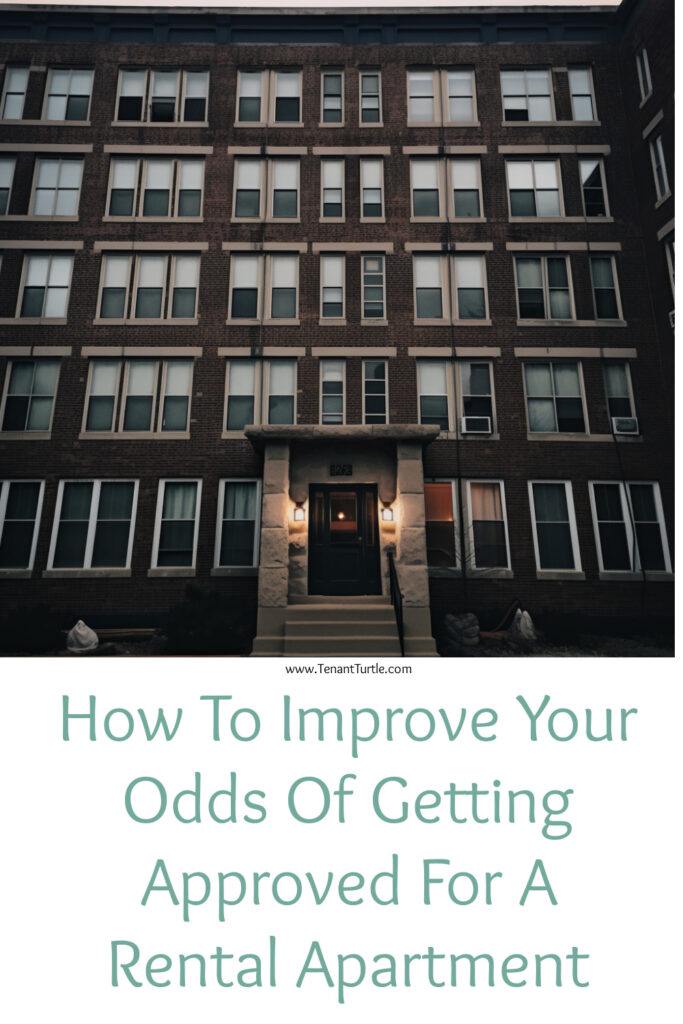
Ways to Improve Your Chances of Getting Approved for a Rental Property

What do Landlords Look For In Rental Applications?
When reviewing rental applications, landlords typically look for several key factors to determine if an applicant would be a good tenant. These may include:
-
- Good Credit: Landlords will typically check an applicant’s credit score and history to assess their financial responsibility and determine if they have a history of paying their bills on time.
-
- Income and Employment History: Landlords want to make sure that tenants have a stable source of income to pay rent, so they will typically ask for employment history and/or pay stubs to verify income. A common rule of thumb is to want the income to be 3x higher than the rent. So if you’re applying to rent an apartment that costs $1,000 a month in rent, they’ll usually want your income to be at least $3,000 a month.
-
- Rental History: Landlords will often contact previous landlords to get a sense of the applicant’s rental history, including if they have paid rent on time and if they have taken good care of previous rental properties.
-
- Criminal History: Landlords may perform a background check to ensure that tenants do not have a history of criminal activity.
-
- References: Landlords may ask for personal or professional references to get a sense of the applicant’s character and reputation.
Overall, landlords want to ensure that the tenant is financially responsible, reliable, and respectful of the property and other tenants.
What Documents Should I Prepare For A Rental Application?
-
- Photo Identification: A government-issued ID, such as a driver’s license or passport, to verify your identity.
-
- Proof of Income: This can include pay stubs, a letter of employment, or tax returns. Landlords want to see that you have a stable income and can afford to pay rent.
-
- Rental History: You may be asked to provide references from previous landlords or contact information for your current landlord. This helps the landlord verify your rental history and see if you have been a good tenant in the past.
-
- Credit Report: Some landlords may ask for a credit report to assess your financial history and determine if you are a responsible borrower.
-
- Bank Statements: Landlords may ask for bank statements to verify your income and make sure you have enough funds to cover rent and other expenses.
-
- Pet Records: If you have pets, you may need to provide records of vaccinations and proof of pet insurance.
-
- Application Fee: Some landlords may require an application fee to cover the cost of running background checks and processing the application.
It’s important to have all of these documents ready before submitting your rental application to make the process smoother and increase your chances of getting approved.
How To Demonstrate Financial Stability To Landlords
-
- Provide Proof of Income: This is the most important factor in demonstrating financial stability. Provide documentation of your income, such as recent pay stubs, tax returns, or a letter from your employer. This will show the landlord that you have a stable source of income and can afford the rent.
-
- Good Credit: A good credit score indicates that you are financially responsible and can be relied upon to make payments on time. If you have a good credit score, make sure to provide it to the landlord.
-
- References: Providing references from previous landlords, employers, or even personal references can show that you are a reliable and responsible tenant.
-
- Savings: If you have savings, this can indicate that you are financially stable and can cover unexpected expenses. You can mention this to the landlord or provide bank statements to show your savings.
-
- Offer to Pay More Upfront: If you have the means, offering to pay a larger security deposit or a few months’ rent upfront can show the landlord that you are financially stable and committed to renting the property.
-
- Provide a Co-Signer: If you have a co-signer with good credit and financial stability, this can give the landlord added security and increase your chances of being approved for the rental.
-
- Create a document of your expenses. If your income is not 3x the rent, but you feel confident that you can afford the apartment, you can compile a document sharing your budget. I did this once when I was younger. I explained how my partner and I both worked from home so we only had 1 car, it was paid off so we had no car payment, just 1 car insurance payment, and minimal gas expenses. I shared how we exclusively used Netflix rather than paying for cable TV and so on. In our case, we really did not need to have 3x the rent in income as we were able to afford to have our rent be more than 1/3 of our income. I proved this by sharing our budget, basically.
By demonstrating your financial stability through these methods, you can increase your chances of getting approved for a rental property.

How To Get Approved For A New Apartment If You Have A Bad Rental History
If you have a past eviction or bad rental history, it can make it more difficult to find a new rental property. Here are some things you can do:
-
- Be Honest: It’s important to be upfront and honest with potential landlords about your past rental history. Explain the situation and what you have done to address any issues. Being honest from the beginning can show that you are taking responsibility for your past mistakes.
-
- Provide References: If you have had positive rental experiences in the past, provide references from those landlords to show that you are a good tenant.
-
- Offer to Pay More: If you have the means, offering to pay a higher security deposit or a few months’ rent upfront can show the landlord that you are serious about renting the property and can make up for any past issues.
-
- Have a Co-Signer: If you have a co-signer with good credit and rental history, this can give the landlord added security and increase your chances of being approved for the rental.
-
- Look for a Property with Less Stringent Screening: Some landlords may be more willing to rent to someone with a bad rental history if they have less stringent screening requirements. Look for properties that may have more relaxed screening policies.
-
- Look at affordable properties. If you have a bad rental history, you may not want to try to rent places that take up a full third of your income (as is the typical income-to-rent ratio). Instead, apply for places that cost less than 1/3 of your income, as landlords will have no doubt that your income should cover the rent.
Remember that having a bad rental history doesn’t mean you won’t be able to find a new rental property, but it may require some extra effort on your part. By being honest and upfront, providing references and additional financial security, and looking for properties with less stringent screening requirements, you can increase your chances of finding a new rental property.
How long does it typically take to get approved for a rental property?
The time it takes to get approved for a rental property can vary depending on the landlord or property management company and the specific property. In some cases, you may be approved within a day or two, while in other cases, it may take several days or even a week or more.
Typically, the landlord or property management company will review your rental application, including your credit report, income verification, and rental history. They may also conduct a background check and contact your references. The time it takes to review all of this information can vary depending on the complexity of the application and the availability of the landlord or property manager.
To speed up the process, make sure to provide all of the required documentation and be responsive to any requests for additional information. If possible, follow up with the landlord or property management company to see if there are any updates or if they need any additional information from you.
Overall, it’s important to be patient during the rental application process and to give the landlord or property management company enough time to review your application thoroughly.

Leave a Comment